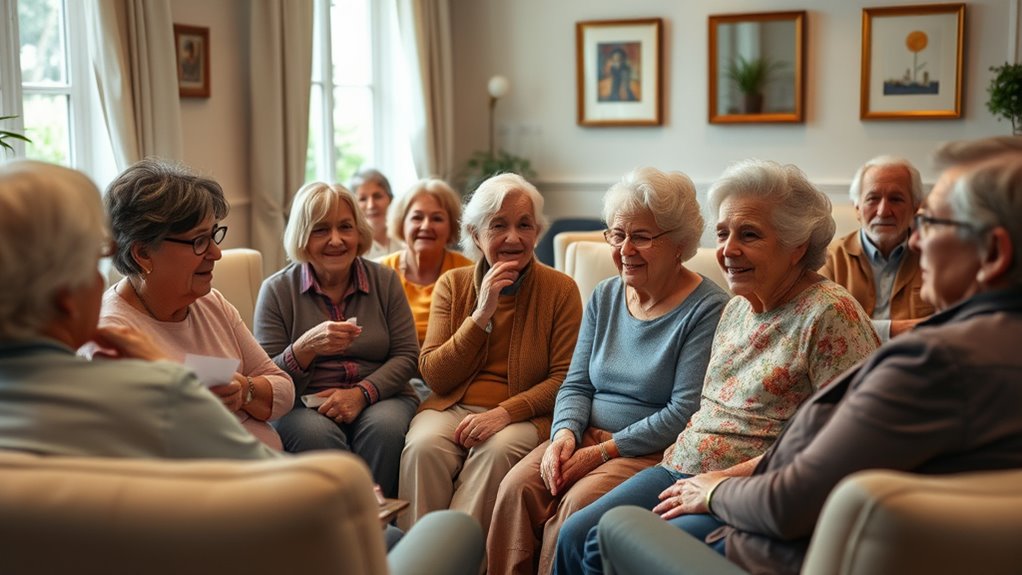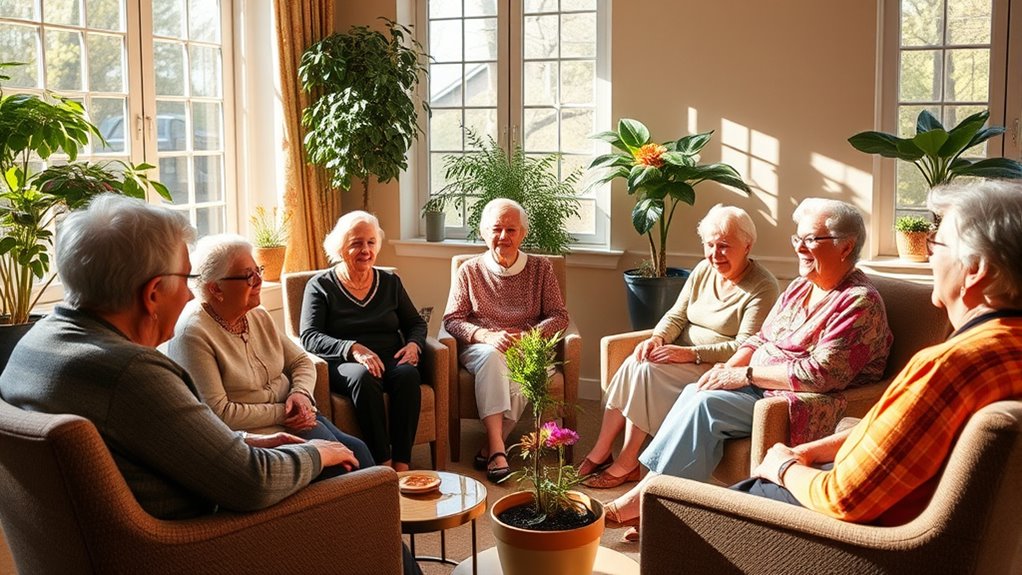Joining a senior divorce support group can help you find emotional comfort and connect with others going through similar changes. These groups provide a safe space to share experiences, gain new coping strategies, and access valuable resources. They also inspire hope and encourage personal growth as you start over later in life. If you’re curious about ways to make this progression smoother, keep exploring what support groups can offer you.
Key Takeaways
- Support groups provide a safe space for emotional healing and connection with peers facing similar divorce challenges.
- They offer practical resources, including financial planning and referrals to experts for long-term stability.
- Participants can share coping strategies to reduce loneliness and foster resilience during life transitions.
- Educational workshops and activities promote ongoing learning and social engagement for seniors starting over.
- Support groups empower seniors to embrace new opportunities, personal growth, and renewed hope after divorce.

Divorce can be especially challenging for seniors, but joining a support group can make the journey easier. As you navigate this significant life change, you might find yourself overwhelmed by a mix of emotions and practical concerns. Support groups provide a safe space where you can share your experiences, gain insights, and find comfort from others who understand what you’re going through. One of the most immediate needs you’ll face is figuring out your financial future. Divorce can drastically alter your financial landscape, making it essential to focus on financial planning. Support groups often include resources or referrals to financial advisors who specialize in senior finances, helping you understand your new financial situation, manage retirement funds, and plan for future expenses. Having others who are also managing similar challenges can give you confidence and clarity as you work through budgeting, dividing assets, and understanding the long-term implications of your divorce.
Joining a support group can help seniors navigate financial changes after divorce with confidence and clarity.
Beyond the practicalities of money, emotional healing is equally indispensable. Divorce can trigger feelings of loss, rejection, and uncertainty, especially after many years of shared life. Support groups create a community where you don’t have to face these feelings alone. Hearing others’ stories and sharing your own can foster a sense of connection and validation. Group members often exchange coping strategies, encouraging words, and advice that helps accelerate emotional healing. Participating regularly can lessen feelings of loneliness, boost your resilience, and remind you that healing is a process that takes time, but is entirely possible. Recognizing the importance of emotional support can significantly improve your recovery journey.
Joining a senior divorce support group also offers opportunities to learn about additional resources, such as legal assistance, health services, and social activities tailored for older adults. These groups often organize workshops or guest speaker events that educate members on topics like estate planning, healthcare options, and maintaining social connections. By engaging with these resources, you can create a thorough plan that addresses both your immediate needs and long-term well-being.
Ultimately, being part of a support group empowers you to take control during a vulnerable time. It helps you develop a balanced approach—addressing your financial planning needs while actively working through emotional healing. You’ll discover you’re not alone in this transition, and that others’ experiences can inspire hope and resilience. With support, you can rebuild your life, embrace new opportunities, and find peace in this new chapter. Support groups serve as a reminder that starting over later in life isn’t just possible—it can be a time of renewal and growth.
Frequently Asked Questions
How Do I Find Local Senior Divorce Support Groups?
To find local senior divorce support groups, start by checking community centers, libraries, or senior centers in your area. You can also search online on platforms like Meetup or AARP, which often list support groups. Consider exploring senior matchmaking services and retirement planning events, as these can connect you with others going through similar experiences. Don’t hesitate to ask your healthcare provider or counselor for recommendations too.
Are Online Support Groups Effective for Seniors?
Online support groups can be effective for seniors because they foster emotional wellbeing and provide peer connection, which are essential during tough times. You can share your feelings, receive support, and gain advice from others who understand your experiences. While they may not replace in-person interactions, these groups help you stay connected, reduce loneliness, and build a sense of community, all critical for starting over later in life.
What Activities Do Senior Divorce Support Groups Offer?
Support groups offer a variety of activities, such as sharing stories, socializing, and skill-building. You’ll participate in engaging exercises like expressive arts, empowering discussions, and empathy-enhancing events. These activities foster emotional healing and forge peer connections, helping you navigate new beginnings with confidence. By joining, you create a caring community, cultivate comfort, and conquer challenges together, making your journey toward renewal both empowering and enriching.
How Can I Manage Financial Stress After Divorce?
You can manage financial stress after divorce by focusing on financial planning and building emotional resilience. Start by creating a detailed budget and exploring new income sources. Practice emotional resilience through self-care and support groups, which help you stay positive and focused. Staying organized and seeking professional advice also reduces anxiety, enabling you to regain control and move forward confidently in your new financial situation.
When Is the Right Time to Join a Support Group?
You should join a support group when you feel emotionally ready and crave peer connection. For instance, Sarah waited until she felt stable enough emotionally and sought others experiencing similar challenges. If you’re noticing persistent loneliness or difficulty coping, it’s a good sign you’re ready. Connecting with peers can provide invaluable support and understanding, helping you navigate this new chapter with confidence and reassurance.
Conclusion
Joining a senior divorce support group can make all the difference as you start over. Nearly 50% of older adults find that these groups help ease the emotional burden and rebuild confidence. Remember, you’re not alone in this journey. Connecting with others who understand your experience provides strength and hope. Take that first step—you might be surprised at how empowering it feels to share and grow together. Your new chapter begins with support and community by your side.










